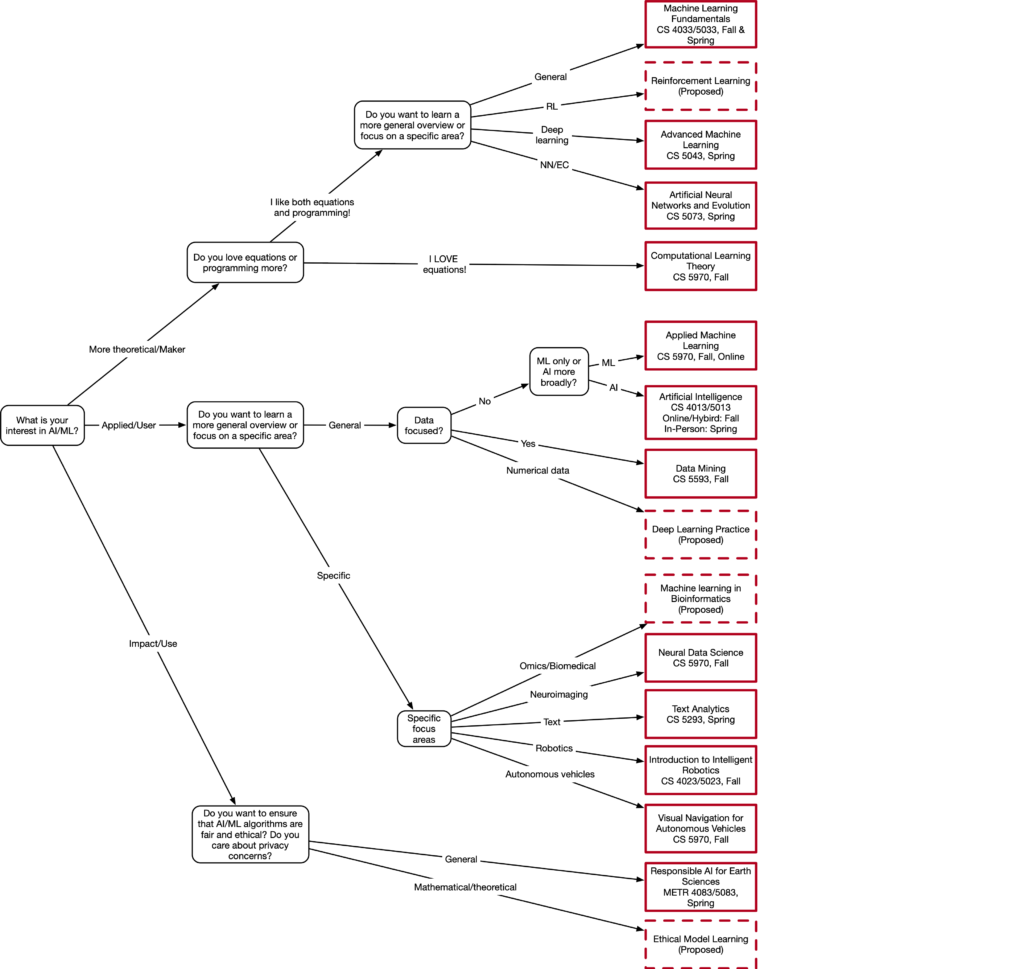Module 1: Introduction to AI
Overview
Executive Summary
- Topics: This module will cover the following topics.
- Intelligent agents
- Introduction to ethical and responsible AI
- Length: This is a short module, less than a week (it is paired with module 0 to take a week for both)
- Assigned chapters: Chapter 2
- Projects: Project 0 is assigned during this module. Find out more on the schedule and projects page.
What will we learn this semester?
You have probably heard about AI in the news and now that you are through all the logistics of the course (see Module 0 if you somehow missed that!), you are wondering what topics will we cover? Good question!
The answer is that AI is far more than what you hear about in the news and covers so many topics that we can’t cover all of it in a semester! AI includes everything from autonomous cars to robotics to route finding to face recognition and lots more! The technology behind each of these applications is vast and more than we can cover in 15 weeks.
My goal with this course is to give you some of the key foundational topics in AI and to make sure you are ready to jump into additional specific topics in other classes. OU offers a lot of AI-related classes and this one is considered the introductory one.
Below I have copied the list of topics from the syllabus and then copied in a diagram from the current slate of OU CS classes that are related to AI. This list is sure to continue to grow and it extends well beyond the classes offered in CS but I am only maintaining the list for CS classes. Hopefully it helps you decide what class you might want to take next, if you enjoy this one!
Topic List
This is the SHORT version with annotations/discussion. The formalized long version is in the syllabus.
It is critically important that we help contribute to ethical and responsible development and use of AI. As such, EVERY module listed below will contain a topic on responsible and ethical use of AI.
- Creating intelligent agents
- How do we make an AI agent? What is an agent anyway? We will focus on this question in Module 1.
- Search
- Idealized searches
- We will look at search in a perfect world. These are useful as they form the foundation of how we make search really happen in the real world. This will be Module 2.
- Searches in the real-world
- The real world is not an idealized environment. Multiple competing agents are often trying to solve similar or the same problems as you and the world changes while you are searching. This will be covered in Module 3.
- Gaming search
- Search in games is different than searching a map. We dedicate all of Module 4 to learning how to search in both simple idealized games and more complicated real-world adversarial scenarios.
- Idealized searches
- Machine learning (ML)
- We have an entire series of classes dedicated to the topic of ML and sub-topics such as deep learning. However, one cannot cover an AI class and not cover ML! We will do a brief overview of several key ML topics.
- ML basics
- We will discuss how one trains a ML model in general so that you understand the critical choices to be made by ML developers. This is Module 5.
- Traditional ML
- We will cover some traditional (non-deep) ML methods in a bit more depth and you will practice implementing some of them in your project. This is Module 6.
- An introduction to Reinforcement learning (RL)
- RL is a very popular method for games but we save it for the ML section since it is not a search method per-se. We will discuss the basics of RL in Module 7.
- An introduction to Deep learning
- Deep learning is what you are hearing about most often on the news when they discuss AI! And you have no doubt heard of chatGPT (we discussed it briefly in the discussion of what resources you can and can’t use). We will discuss some of the technology behind chatGPT and other generative AI methods in Module 8.
OU AI/ML classes
The flowchart may help you pick other AI/ML classes in your OU career!

Jump to the first topic on What is AI?
